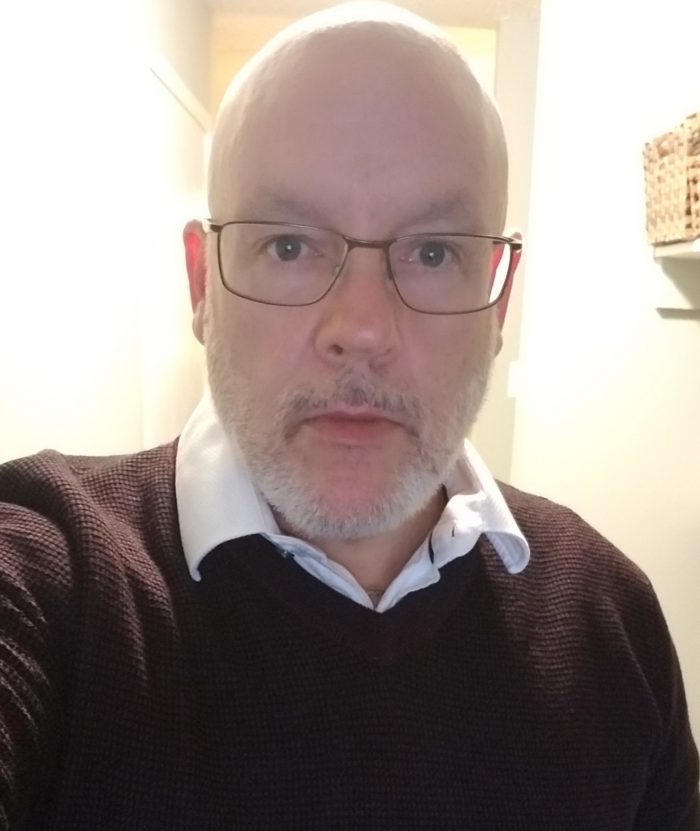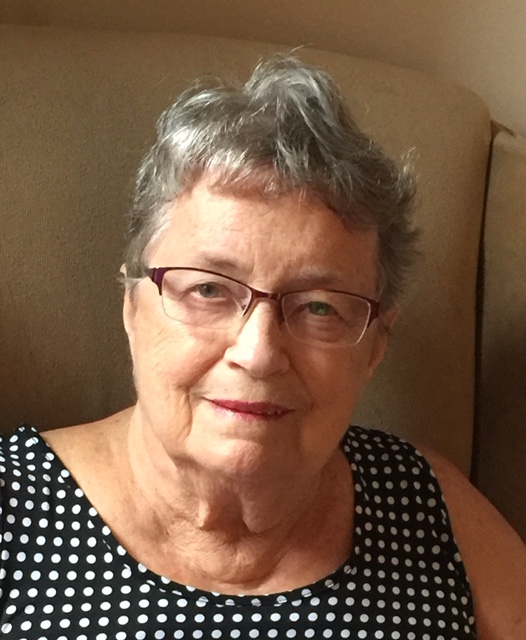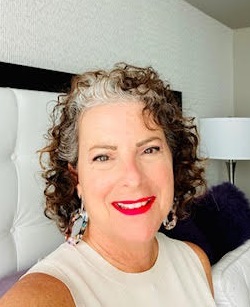Living in COVID Times
The COVID-19 pandemic has been many things – concerning, unprecedented and full of unknowns – and there has been a wide range of reactions and approaches to dealing with it. We interviewed four individuals – all heart patients – who generously shared their experiences of this time so far. Their stories present a few of the many diverse ways that our community has been adapting and managing in this unprecedented period.
Angela Peterson

Q. What has been your approach to the COVID-19 period?
When the pandemic first hit, we stayed isolated at home, only going out for groceries once a week very early in the morning, cleaning all the groceries after bringing them home, etc. For the first phase of the pandemic my brother and I only did porch visits with my parents, which was really hard for them. Once Phase 2 hit, we decided to make sure we were in a ‘bubble’ with my parents, because we’d start to notice the mental health impact on them. They’re still struggling with it, but are doing a bit better over the past few weeks.
It was really hard being stuck in the house, but in the past three weeks we’ve started to do more and spend time outside of the home – it took us a while to get to that point. I’m less concerned about grocery shopping now, and have started going a couple of hours past the first opening. We’re taking the kids out a bit more – taking them for ice cream or beaver tails, going for a car ride or sitting somewhere where there’s no one around. I’m still a bit nervous; if we see crowds we walk away. We started to go out a little more because we wanted to check our feelings and also didn’t want our kids to be scared. We always use masks, sanitizer and wipes – what’s really interesting and scary is how many people aren’t.
Q. Are there any aspects of your life that you feel have made this experience different for you than for others in your circle?
My father and I both have significant health issues that make us high risk – he’s in the hospital quite a bit and I’ve had to go in as well. Not everyone in my circle is in the same predicament or taking the same precautions – everyone has their different perspectives and circumstances.
Q. What has been the most challenging for you about this time?
My biggest challenge is my work-life balance and not having time to myself. Being a parent, it’s always busy – my husband and I are both working from home. I’m working at my dining room table, so it’s hard to get away from it – I’m always ‘on’. Home schooling while working from home is also a challenge.
Even though we see my parents and don’t wear masks, we still aren’t hugging and kissing them because we have that concern and I miss that part. I also used to see my brother and nephew a lot more often but we spend less time together now and that’s been challenging for sure.
Q. What has been the most positive aspect for you about this time?
The really positive aspect has been spending a lot more quality time with my husband and family. We’ve done lots more cooking and baking, my younger daughter and I did an online cooking demonstration together, enjoying our new tiny pool and gazebo in our backyard, etc. I also feel like I’m rushing around less without all the driving back and forth to the girls’ many activities and commuting to work – everything going virtual has freed up some of my time.
Q. What is your outlook for the coming months?
I’m very nervous about the school announcement (on July 30). Daycares have had many outbreaks, so what will the impact be when all our kids return to school? I’m anxious because I don’t know what’s going to come and because kids have less control over their situation. I’m glad that masks will be mandatory for kids of my children’s age and I want to join the parent council this year to be part of relaying and receiving information. For my job, I’ll have to go in a couple of times a week and otherwise work from home, but it’s in a very populated area so I’m a little on edge. That said, I take all the precautions and have a very supportive employer who’s also being very careful so that’s reassuring.
Steven Barger
 Q. What has been your approach to the COVID-19 period?
Q. What has been your approach to the COVID-19 period?
At first I was isolating, then after two or three weeks I started doing more social distancing. I struggle with depression that can be triggered just from being inside, so I made the decision to break my isolation for my mental health. I have some very close friends and initially we tried to meet over FaceTime, but then we switched to the social distancing approach. I also try to maintain a healthy diet and stay physically active – walking and hiking on trails, some cycling, now paddling. It’s easier now with restrictions loosened. My friends and I are all pretty aware and responsible. I’m not as worried as some – I think I got exposed to the virus already but without symptoms.
Q. Are there any aspects of your life that you feel have made this experience different for you than for others in your circle?
During this period I dealt with a separation, my mother passed away at Easter and I’m looking after my 91-year-old dad.
Q. Overall, how have you experienced the last few months?
It’s been many things – challenging, positive, relaxing, busy – it all depends on my outlook. Because of the hardships I’ve faced, I’m looking at the positives: I still have my kids, I still have my dad. I’m grateful for my heart attack: it led me to lose weight and get healthy. Sometimes I focus on the positive, sometimes that slips. I’ve been very physically active but I’ve also eaten lots of junk food and am now getting back into shape. I’ve read books I’ve been meaning to read for a long time to make my mind stronger, practice gratitude journaling and have been doing lots of soul searching. I think it’s important to see the positive in things, especially when everything you see on the news is negative: If you focus on the negative and worry about that all the time, that’s all you’re going to see.
Q. What has been the most challenging for you about this time?
Keeping a schedule and being organized. Sometimes things get dropped, sometimes they don’t. You’ve gotta get your sleep sometime.
Q. What has been the most positive aspect for you about this time?
Reacquainting with family again. Playing with my girls when I have them. Working on myself.
Q. What is your outlook for the coming months?
The second wave is coming. Somehow, some way it will hit. I’m a little concerned about that only because of the mental health impacts it will cause for some people, but I’m optimistic as well. I’m hoping that this experience will make us stronger as a society. I hope some will take it differently the second time around – some people seem terrified and I hope they’ll learn to be less fearful. My advice is: yes, it’s there, but just be smart.
Marjorie Pettigrew
Q. What has been your approach to the COVID-19 period?
At the beginning I was quite careful – I stayed at home except to go to the grocery store and when I went it seemed quite safe to me. I wear a mask and wash my hands, but I’ve never washed my groceries or my counters to protect against COVID-19. My daughters didn’t come visit for the first few weeks, but recently they’ve started dropping in. All of them work and one has a job that requires her to interact with the public, but I’m not concerned. I’m 82 and since I mainly hang around with people my age, I think it’s a little safer. I think young people are a lot more exposed – my grandkids for example are a lot more exposed so I’ve only seen them once since the pandemic began.
Q. Are there any aspects of your life that you feel have made this experience different for you than for others in your circle?
I live alone, so I want to get out and talk to people. I’m fairly social anyway, and I think there’s a distinct difference if you live with someone – most of my married friends seem fine with isolating for months and months. Luckily I have a few friends who feel like me – they also live alone and feel that they need to get out and see people. We get together for dinner – we order in or I cook and we eat on the deck, or I’ve been and eaten at their houses on their decks.
Q. Overall, how have you experienced the last few months?
Mostly I just feel frustration that I can’t get together with my friends – they’re staying at home, not going out, getting groceries dropped off in the hall. As see it, if you’re confining yourself to your house waiting for the vaccine, you won’t see anyone until 2022. I currently have heart failure, and I feel that my chances of lasting until then are reasonably slim, so I can’t spend the rest of my life stuck in the house. My social life mostly consists of going out to dinner, so if Ontario Public Health says it’s ok to do so then I’m going for it. I’m actually going specifically to restaurants with indoor dining areas, to support their business. It’s really weird – I feel safer inside because we’ve been alone in the dining area, wearing masks and only interacting with our waiter who wore a mask. In contrast, patios were comparatively very full and social distancing seemed harder to maintain. Sometimes I just go for a drive to see the world, and one thing I have noticed is that I’m getting pleasure from simple things. I went to Westgate one time, for example, and saw lots of people out and about: it gave me pleasure just to see that.
Q. What has been the most challenging for you about this time?
The difficulty I have with this whole thing is my friends –I have a hard time with not being able to get together with them; I miss our social life together.
Q. What has been the most positive aspect for you about this time?
Others have said they’ve enjoyed the time alone or found new activities, but that hasn’t been my experience. The only positive aspect I can think of is that I’m better off financially – the government sent me a $300 cheque unexpectedly, and because I’m not going out as much I’ve been spending less.
Q. What is your outlook for the coming months?
I feel fairly strongly that they’ll be no different than the last few months. I think Canada’s handled it reasonably well – we may have a surge but nothing we can’t handle. I feel sorry for those people who can’t go out of their homes – I believe we’re going to live with this virus for a very long time and so I think we need to learn to live with it.
Risa Mallory
Q. What has been your approach to the COVID-19 period?
When we first heard about COVID-19 we were in Arizona for our annual 6 month winter stay there. We came home early and self-quarantined for 14 days. During that time, we ordered groceries online which were delivered to our door, and friends and neighbours offered to do extra runs for us. We would slip out for walks, all the while being very aware of social distancing. Because my spouse and I both have heart disease, we’re pretty aware of our increased risks and we’ve been sticking to all the recommendations from the Ontario Ministry of Health. Once the quarantine period expired, I would go to the drugstore and specialty grocery stores that don’t offer curbside pickup, but otherwise I still shopped for everything online. When Phase 2 opened up the golf courses, we went right away and were encouraged to see all the necessary sanitizing and social distancing measures being taken. With Phase 3, we now socialize outside with friends and relatives on their patios, and on restaurant patios, but I am not yet comfortable going to a restaurant for indoor seating.
Q. Are there any aspects of your life that you feel have made this experience different for you than for others in your circle?
I had a triple Spontaneous Coronary Artery Dissection (SCAD) heart attack 16 months ago and there was quite a lot of residual heart damage, so that makes me feel a little more susceptible to contracting the coronavirus and the damage which can result from it. As a result, I am probably more vigilant than I might otherwise have been. I feel very fortunate that I live with somebody. I think that a huge determinant of physical and emotional health during this time is to have someone to touch, hug and talk with. I also feel grateful to have had distractions during this time of isolation such as my volunteer work with the Canadian Women’s Heart Health Centre, being an administrator on a Facebook group, attending many heart health related podcasts, as well as weekly FaceTime calls with extended family to play online games.
Q. Overall, how have you experienced the last few months?
The two weeks of quarantine were probably the hardest because we were the most restricted and isolated and the weather was still yucky. As soon as I could get to the hairdresser and the golf courses opened, I began to feel a returning sense of normalcy. Playing golf checks off so many boxes for me with respect to my mental and physical health. I get out of the condo, socialize, breathe fresh air, get some exercise, and so appreciate the sense of getting back to a former routine. We were watching the Prime Minister’s address for the first couple of months and felt reassured as we saw that he was consulting with specialists and basing emerging guidelines on science and research. So we took our government’s leadership to heart and we continue to do our part to protect ourselves, our neighbours and the global community.
I’m a retired psychotherapist and in my personal life, I have always practiced an attitude of gratitude. Life can be messy and inconvenient, but I believe that we all have a choice about how we think and behave and I work on not worrying about things I cannot control such as a novel virus and other people’s behaviours and choices.
Q. What has been the most positive aspect for you about this time?
There have been many positives to outweigh the stress caused by the uncertainties during this time. What has been the most special to me is the sense of community and fellowship that I’ve experienced and witnessed, when people rose to the occasion to help each other. For example, we were touched by the help we received from friends and neighbours during our initial quarantine and once that period was over, we began offering single neighbours help with their groceries.
We live right beside a retirement home which was on total lockdown. On Mother’s Day, I looked outside and there was a caravan of 30 cars circling the residence for about 30 minutes, honking their horns and waving out of their sun roofs. Residents were out on their patios or balconies and were waving back – it was so special. For the first three months this same residence held many activities from the parking lot, such as bingo, exercise classes, musical concerts and trivia games.
Q. What is your outlook for the coming months?
I think globally, we still have a formidable journey ahead of us to flatten the curve of this pandemic, but I am guardedly optimistic that we can do just that. I am still wanting to travel. In fact we have already booked a one-way flight to Arizona for our winter getaway. We are not sure what this winter will look like for us, but we will adjust as necessary. I am very hopeful that a vaccine will be made available in the next 12 months and that will go a long way to giving us all some peace of mind. I want to believe that individually and globally we will learn from this shared experience to be more appreciative, more resilient, more flexible and more compassionate. Above all, because of my heart incident, I am just happy to be here.

